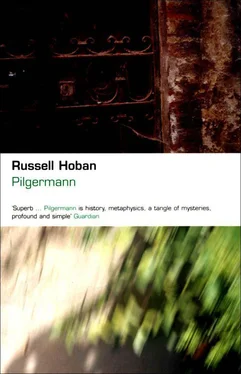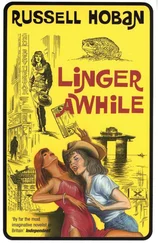Russell Hoban - Pilgermann
Здесь есть возможность читать онлайн «Russell Hoban - Pilgermann» весь текст электронной книги совершенно бесплатно (целиком полную версию без сокращений). В некоторых случаях можно слушать аудио, скачать через торрент в формате fb2 и присутствует краткое содержание. Год выпуска: 2002, Издательство: Bloomsbury Publishing PLC, Жанр: Современная проза, на английском языке. Описание произведения, (предисловие) а так же отзывы посетителей доступны на портале библиотеки ЛибКат.
- Название:Pilgermann
- Автор:
- Издательство:Bloomsbury Publishing PLC
- Жанр:
- Год:2002
- ISBN:нет данных
- Рейтинг книги:5 / 5. Голосов: 1
-
Избранное:Добавить в избранное
- Отзывы:
-
Ваша оценка:
- 100
- 1
- 2
- 3
- 4
- 5
Pilgermann: краткое содержание, описание и аннотация
Предлагаем к чтению аннотацию, описание, краткое содержание или предисловие (зависит от того, что написал сам автор книги «Pilgermann»). Если вы не нашли необходимую информацию о книге — напишите в комментариях, мы постараемся отыскать её.
Pilgermann — читать онлайн бесплатно полную книгу (весь текст) целиком
Ниже представлен текст книги, разбитый по страницам. Система сохранения места последней прочитанной страницы, позволяет с удобством читать онлайн бесплатно книгу «Pilgermann», без необходимости каждый раз заново искать на чём Вы остановились. Поставьте закладку, и сможете в любой момент перейти на страницу, на которой закончили чтение.
Интервал:
Закладка:
And the arming of them! While these boys ripen like peaches on the tree of war there are heard, first here, then there, then everywhere the clink of hammers and the windy breath of bellows. All through the Christian world and all through Islam rise and fall the brawny arms of smiths beating out the passing moments into days and weeks and years of swords, spearheads and arrowheads, lances, pikes, maces, axes, mail shirts and iron helmets, spurs, stirrups, bits, and horseshoes. Hammers and anvils of flesh, hammers and anvils of iron striking the years! Fires of war in forges east and west, their red coals purring! Red-hot iron, red-hot steel and a leaping up of golden sparks under the hammer blows! Hungry iron, hungry steel, hungering for flesh!
And I too, Pilgermann! I too, with prayer-shawl, with fringes and phylacteries, with books and surgical instruments, I too have been ripening on this tree of war. But I am wrong to say ‘tree of war’; if one speaks of trees then there is only one tree: of war and peace and everything else; not only do soldiers ripen on it but all who live in this world; it is a wondrous tree and it bears different fruits in different seasons to be shaken down by the winds of necessity, plucked by the hand of circumstance. The dead Jews on the cobblestones before the synagogue, the dead girl with her skirt over her face, they too have grown on this same tree with the soldier-fruits. And my Sophias first and second. And these dead who walk with me. And my own young death as well. How difficult it is to speak of any single thing — one takes notice of a stone at the foot of a mountain, steps back to look at the mountain, walks far enough away to see the top of it, climbs another mountain to see the plain beyond the first one, and little by little widening the view sees from a very long way off our little cloud-wreathed planet swimming in the sea of space, and it is only one thing after all.
Stones! When the hammers are heard on the anvils of war the stones will not be found unready; they will come to hand equally for those who besiege and those who defend. Built up into strong walls they await the rumble of the seige tower, the shock of the ram, the crash of the stone that comes whistling from the mangonel. War sets one stone against another, calls this one a missile, that one a stronghold. But the freemasonry of the stones is stronger than the temporary loyalties imposed on them; they do what is required of them but in their hardness they retain their one essential fact: they know that they are all one thing. What do the stones say? ‘We have no enemy.’ This I have not read in a book, this I have heard them say and I know it to be true. Muslims build them up and Christians knock them down or Christians build them up and Muslims knock them down; war and peace and the passage of what is called time shake and throw them like dice and in the throws read winning and losing. But the stones of Jerusalem laughed when the Temple was destroyed. ‘Full quittance!’ they shouted. ‘Full quittance for the sins of the Jews!’
And what were the sins of the Jews? The graven images, the idols, the high places, the Baalim and the Ashtaroth, the adulteries of spirit and of flesh. And why did God rage so because of these acts, why were they not to be tolerated by Him? Because the insult was too monstrous to be borne. Because He had chosen the Jews for His vessel, He had chosen them to be the ark of the idea of Him and of It, the idea of the Unseen, the Ungraspable, the Unknowable, the idea never to be contained by the mind that is contained by it. He had chosen them to be mind-heroes, to open their minds to the idea that could not be held by any mind, and what did they do? They fouled themselves, they rolled in the dung and the degradation of the see-able, the knowable, the ordinary. They said to stocks and stones, ‘Be thou our God.’
I do not forget thee, O Jerusalem. But what is Jerusalem but the seeable and the knowable? What is Jerusalem but the stones that have no enemy? The stones on which Christ walked, the stones over which he dragged his cross, the stones of that Western Wall that alone remain of the Second Temple, are they to be held sacred, are they to fill the eye with the seen? It is the Jerusalem of the heart that must not be forgotten because in the Jerusalem of the heart is the heart of the mystery where lives the idea of the Unknowable that is God.
I say that now when I have been dead for centuries, I say it now that I am more or less full-grown. But in this time that I have been speaking of, in this time called A.D. 1096 when I trudged my road to Jerusalem I was going to a Jerusalem that lived in my mind as coarsely painted and as vividly coloured as an inn sign, a Jerusalem of blazing eastern sun and buzzing flies, of awninged blue-shadowed bazaars in the narrow streets walled in by tawny stone far, far away at the end of many days, many nights of perilous roads and long dusty approaches. When I thought of the gates of Jerusalem I thought of sunlight dazzling in its white brilliance, I thought of blue and purple shadows among which had moved the shadow of the very hand of God, a seen shadow. And it was a seen Christ that I was travelling towards, a Christ who had already appeared to me and had spoken to me.
Now help me, Memory! Let me find again that road of youth and pain, let me hear again the tramp of thousands to Jerusalem:
Thy dead shall live, my dead bodies shall arise—
Awake and sing, ye that dwell in the dust—
For Thy dew is as the dew of light,
And the earth shall bring to life the shades.
Marzipan. Manticore. Mazery. Manzikert. Manzikert, yes. And the name of that pope isn’t Unguent VII, it’s Urban II. But I was saying Manzikert. Nobody can deny that after the Battle of Manzikert in 1071 Byzantium was no longer what it had been. The Emperor Romanus, taken prisoner at Manzikert, was blinded; and it was a Jew who was forced to perform this office. I hear the voices of Romanus and his Jewish executioner mingled in a constant faint murmur barely audible among the stronger transmissions in the hum and crackle, the roar and whine and whistle of the cosmos; it’s astonishing how many individual voices can be distinguished in what one would think of as a general uproar.
Any sequence of events is interesting because of its positive and negative shapes. Take a pair of scissors and cut something out. Anything. Why not a devil with horns and a tail and cloven hooves. So. There is your paper with a devil-shaped hole in it. Two devil-shapes, one positive, one negative, and both of them made at the very same moment. Was the Battle of Manzikert the shape of the paper or the shape of the hole? It’s as I’ve said before: there is always a twoness in the oneness, and for this reason it’s almost impossible to know what is happening in the space-time configuration. Not only that: as soon as an effort is made to look at any particular thing the aspect of that thing becomes other than what it was — that event that happened in full view when unlooked-at covers itself when observed, spins around itself one of those wonderful encrusted eggs with a peephole in one end of it; I the observer, receding reactively from the gaze that proceeds from my eyes, find myself shot into the distance thousands of miles away from the peephole. Inch by inch I think my way back; closer, closer, closer I come and here it is all tiny — the tiny, tiny Battle of Manzikert. Closer still and I am in the dust and the trampling of it, hearing the grunts and the shouts of the living and the sighs of the dying.
How nothing is simply one thing! There comes to mind unaccountably an order of the day from Jenghis Khan to his horsemen at some distance from 1071, a century or two perhaps. In this order he commands his men to leave their horses unbridled on the march — they are to have their mouths free, they are not to be galloped on the march.
Читать дальшеИнтервал:
Закладка:
Похожие книги на «Pilgermann»
Представляем Вашему вниманию похожие книги на «Pilgermann» списком для выбора. Мы отобрали схожую по названию и смыслу литературу в надежде предоставить читателям больше вариантов отыскать новые, интересные, ещё непрочитанные произведения.
Обсуждение, отзывы о книге «Pilgermann» и просто собственные мнения читателей. Оставьте ваши комментарии, напишите, что Вы думаете о произведении, его смысле или главных героях. Укажите что конкретно понравилось, а что нет, и почему Вы так считаете.












